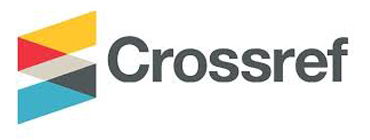AN ERROR ANALYSIS ON EFL STUDENT’S REFLECTIVE JOURNAL WRITING ON ONLINE BLOGGING AT TARBIYA AND TEACHERS TRAINING FACULTY STATE ISLAMIC UNIVERSITY OF NORTH SUMATERA
Abstract
The aim of this study was to find out: 1) the kinds of error made by EFL student’s reflective journal writing on online blogging, 2) the process that the EFL student did in producing errors, 3) the causes of error happened on EFL student's reflective journal writing. This study was categorized into a qualitative content analysis. The data of this study were 10 reflective journal writings of EFL student on her blogging account and the data source was one of the EFL students of State Islamic University of North Sumatera. The data were observed by purposive sampling. Thus for the results of this study, the researcher found five kinds of errors that appeared on EFL student’s reflective journal writing on her online blogging. They were; error in time, omission error, insertion error, part of speech error and other errors. The errors happened unconsciously, the EFL student made errors by eliminating, adding some unnecessary word and disordering some words in arranging sentence. There were several factors behind the occurrence of errors, namely Interlingua transfer, intralingua transfer, lack of vocabulary, and the use of inappropriate translate techniques.
Keywords: Error Analysis, Reflective Journal, Online Blogging, and Surface Strategy Taxonomy
Full Text:
PDFReferences
Brown, D., (2000). Principle of Language Learning and Teaching. New York: Longman.
Bustomi, A. (2009). An Error Analysis on Students Descriptive Writing (A Case Study on Student of Harapan Jaya Senior high school on Cipondoh, Tangerang).Jakarta: State Islamic University.(Thesis).
Celce, M. &Elite, O. (2000).Discourse and Context in Language Teaching.New York: Cambridge University Press.
Cheng, G. (2017). The Impact of Online Automated Feedback on Students' Reflective Journal Writing in An EFL Course. The Internet and Higher Education, 34, 18–27.
Dewi, U. (2013). How to Write. Medan: La-tansa Press.
Dulay, H. (1982). Language Two. New York: Oxford University Press.
Ellis, R. & Barkhuizen, G. (2008). Analysing Learner Language. Oxford: Oxford University Press.
Farah, M. (2012). Reflective Journal Writing as an Effective Technique in the Writing Process.An-NajahUniv (Humanities), 26(4).
Farbman, E.(1985). Signals a Grammar and Guide for Writers. Boston: Houghton Mifflin Company.
Fithriani, R., Rafida, T., &Siahaan, A.(2019).Integrating Online Blogging into EFL Writing Instruction: Exploring Students’ Perceptions.Advances in Social Science, Education and Humanities Research, 188, 87-90.
Fang, H.& Sarah, S. (2005). Three Approaches to Qualitative Content Analysis.Qualitative Health Research Article, 15(9), 1277-1285.
Graham, L. (2003). Writing Journal: An investigation.Journal writing outcomes, 37 (1), 39-42.
Hollnagel, E. (1998). Cognitive Reliability and Error Analysis Method. Norway: Elsevier Science Ltd.
Itani, T. (2012).The Quran Dallas: Clear Quran.
Jeffries.(2006). Discovering Language the Structure of Modern English. England: Macmillan Distribution.
Kern, R.(2000). Literacy and Language Teaching, New York: Oxford University Press.
Lamonica, C.(2010). What Are the Benefits of Blogging in the Elementary Classroom?St. John Fisher College.
Mayers, A.(2005). Getways to Academic Writing: Effective Sentences, Paragraphs, and Essay.New York: Longman.
Norrish, J. (1983). Language Learners and Their Errors. London: Macmillan Press.
Oppong, S.Harrison.(2013).The Problem of Sampling in Qualitative Research.Asian Journal of Management Sciences and Education, 2(2), 202-210.
Oshima, A.& Hogue, A. (2007).Introduction to Academic Writing.New York: Pearson Longman.
P., Davies&Pearse,E. (2000).Success in English Teaching. Oxford: Oxford University Press.
Priest&Sturgess.(2005).”But, Is It Scholarship? Group Reflection as Scholarly Activity.Studies In Learning.Evaluation Innovation and Development”, 2(1).
R., Hartman& F., Stork.(1972). Dictionary of Language and Linguistics.London: Applied Science Publisher Ltd.
Salehi, M.&Bahrami, A. (2018).An Error Analysis of Journal Papers Written by Persian Authors.Cogent ARTS & Humanities, 5(15), 1-16.
Sani, K.&Nurwanti, D.(2018).The Use of Reflective Writing to Improve Students’ Writing and Critical Thinking Skills.Journal of Education and Practice, 6(13), 331-335.
Santoso, D.&Pirman, G.(2015).Bilingual Education Programs at Junior High Schools. Jakarta: KencanaPrenadamedia Group.
S.,Mangungu. (2010). Error Analysis Investigating the writing of ESL Namibian Learners.University of South Africa, Pretoria, South Africa.(Thesis).
Wallace, et al.(2004).Teaching Speaking, Listening, and Writing.International Academy of Education. (http://unesdoc.unesco.org/ark:/). Accessed 10 on August 2020.
Refbacks
- There are currently no refbacks.

This work is licensed under a Creative Commons Attribution-NonCommercial-ShareAlike 4.0 International License.
INDEXING
Bright Vision by UIN Sumatera Utara Medan is licensed under a Creative Commons Attribution-NonCommercial-ShareAlike 4.0 International License.
Based on a work at http://jurnaltarbiyah.uinsu.ac.id/index.php/brightvision.









